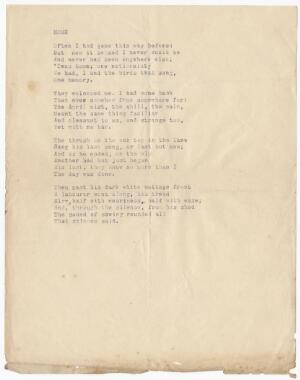Identity area
Reference code
Title
Date(s)
- 1915, Apr. 17 / (Creation)
Level of description
File
Extent and medium
Context area
Name of creator
Biographical history
Edward Thomas (1878-1917), poet and writer, was born Philip Edward Thomas in Lambeth to Welsh-born parents on 3 March 1878. He was educated at St Paul's School, London and Lincoln College, Oxford. Having left St Paul's, Thomas studied for the civil service examination, a move which expressed parental ambition rather than his own as he had reacted against the wordly views of his father, who worked for the Board of Trade and was prominent in Liberal politics. He was encouraged in his early literary ambitions by the critic James Ashcroft Noble and Thomas's first book, The Woodland Life, inspired by his love of the natural world, appeared as early as 1897. Thomas married Noble's daughter Helen (1877-1967) in 1899 and, having graduated from Lincoln College in 1900, made a precarious living as a literary reviewer for the Daily Chronicle whilst also writing essays, anthologies, guidebooks and folk-tales. He also published further books, including The Heart of England (1906), as well as biographical writings, most notably those on Richard Jefferies (1909), Maurice Maeterlinck (1911), Algernon Charles Swinburne (1912) and Walter Pater (1913). This period also produced his autobiographical works The Happy-Go-Lucky Morgans (1913), The Icknield Way (1913) and In Pursuit of Spring (1914). Possibly from an overwhelming feeling that his creativity was shackled and frustrated, Thomas at this time suffered recurrent physical and psychological breakdowns which once took him to the brink of suicide. It was not until 1914 that he wrote his first 'real' poem, entitled 'Up in the Wind'. The wartime collapse of the literary market at last afforded Thomas more time to write poetry; over a space of two years, he was to write over one hundred and forty poems. In 1915 Thomas joined the Artists' Rifles; he was commissioned second lieutenant in 1916 and volunteered for service overseas. In April 1917 he was killed during the first hour of the battle of Arras in northern France and buried the following day on the outskirts of the town; he therefore did not live to see the publication of his Poems (1917) (under his pseudonym Edward Eastaway), nor the subsequent Last Poems (1918) and Collected Poems (1920). His wife Helen wrote of their time together in As It Was (1926) and World Without End (1931). Thomas numbered amongst his poetical and literary influences Robert Frost, Thomas Hardy, W. B. Yeats, D. H. Lawrence, Walter de la Mare, and W. H. Davies.
Archival history
Once owned by Mary Elizabeth Thomas.
Immediate source of acquisition or transfer
Content and structure area
Scope and content
First line: Often I had gone this way before. Written in Steep. Typescript.
Appraisal, destruction and scheduling
Action: digitized. Action identifier: cymruww1. Date: 2013. Authorization: The Welsh experience of World War One, 1914-1918.
Accruals
System of arrangement
Conditions of access and use area
Conditions governing access
Conditions governing reproduction
Language of material
- English
Script of material
Language and script notes
English.
Physical characteristics and technical requirements
Finding aids
Allied materials area
Existence and location of originals
Cardiff University.
Existence and location of copies
Digital version available https://viewer.library.wales/3444324 (January 2024)
Related units of description
Notes area
Note
Item from Edward Thomas Archive, 424.
Note
Preferred citation: 424/2/61/1.
Alternative identifier(s)
Virtua system control number
Project identifier
Access points
Subject access points
Place access points
Name access points
Genre access points
Description control area
Description identifier
Institution identifier
Rules and/or conventions used
Status
Level of detail
Dates of creation revision deletion
Language(s)
- English
Script(s)
Sources
Digital object metadata
Latitude
Longitude
Media type
Image
Mime-type
image/jpeg

